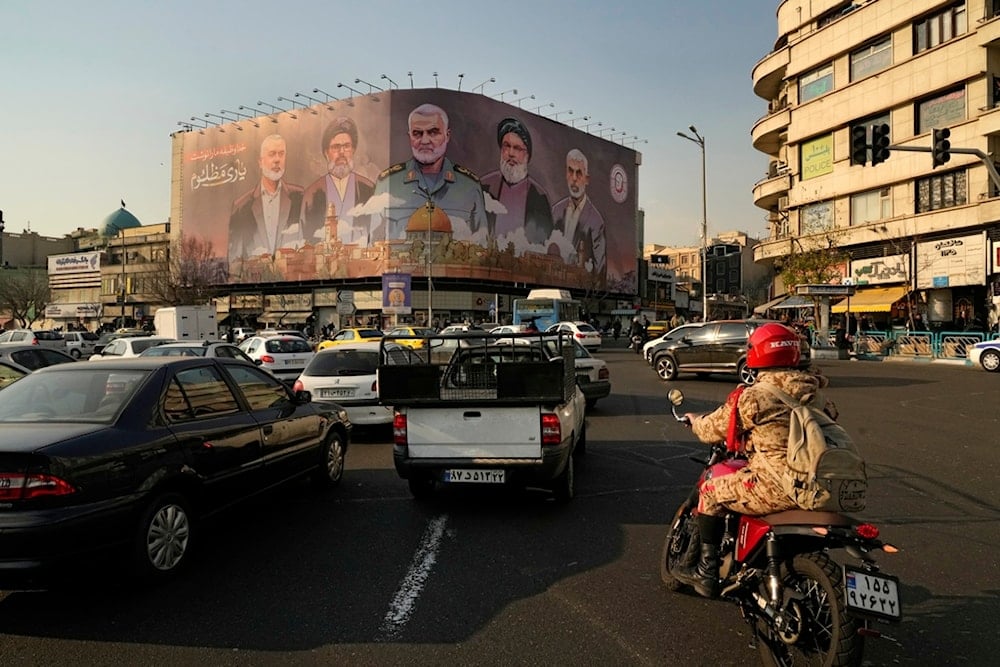Tehran weighs US request for renewed nuclear talks: Report
Iran is reviewing a US request to resume nuclear talks, insisting negotiations should include reparations, sanctions relief, enrichment rights, and security guarantees.
-

Vehicles drive on Enqelab-e-Eslami (Islamic Revolution) square in Tehran, Iran, on January 21, 2025. (AP Photo/Vahid Salemi)
The Iranian Ministry of Foreign Affairs is currently reviewing a US request to resume nuclear negotiations, informed sources told Mehr News Agency on Tuesday. The overture, transmitted through intermediaries from multiple countries, comes in the aftermath of a failed US military campaign to dismantle Iran's nuclear infrastructure and amid growing international pressure to de-escalate tensions.
The request reportedly outlines a potential agenda that includes the lifting of sanctions, setting limits on uranium enrichment, and addressing compensation, possibly linked to the recent 12-day war that followed coordinated US-Israeli strikes on Iranian nuclear sites.
While Iranian officials have not publicly confirmed the specifics, diplomatic sources say the Foreign Ministry is assessing both the validity of the US proposals and the broader context in which such talks could occur.
Diplomacy amid deception
This development comes against the backdrop of a major shift in regional diplomacy. Turkish Foreign Minister Hakan Fidan confirmed Ankara's role in relaying the US position to Tehran. Speaking on the sidelines of the BRICS summit in Brazil, Fidan revealed that he had discussed the matter in separate meetings with Iranian Deputy Foreign Minister Abbas Araghchi and US Special Envoy Steve Witkoff. He noted that Turkey had also raised the topic at the Economic Cooperation Organization (ECO) summit, underscoring Ankara's intermediary role in a rapidly shifting geopolitical landscape.
The renewed US interest in diplomacy follows widespread criticism of the Trump administration's pre-emptive military strike. As The Atlantic recently revealed, Trump had decided to attack Iran's nuclear facilities days before publicly suggesting renewed talks, an act widely seen as a calculated deception.
While administration officials declared the mission a success, US military assessments and independent experts have cast doubt on its effectiveness, pointing to limited damage and Iran's rapid repositioning of key nuclear assets.
Iranian Foreign Minister Abbas Araghchi has since laid out clear conditions for any future negotiations: the continuation of domestic uranium enrichment, complete sanctions removal, and a formal commitment not to pursue nuclear weapons. He added that any future diplomatic framework must take into account Iran's demand for reparations and reflect the new political reality following what Tehran considers an illegal act of aggression.
Adding to the diplomatic strain, Iran has suspended all cooperation with the International Atomic Energy Agency (IAEA) and barred its director, Rafael Grossi, from entering the country. Additionally, Iranian officials accuse Grossi of leaking sensitive nuclear data to "Israel," resulting in the murder of hundreds of civilians.
Read more: IAEA to be held accountable for pre-strike Iran assessments: Lavrov
Despite these tensions, both Iranian and Turkish officials have indicated that diplomacy is not off the table. As Araghchi put it in a recent interview, "The doors of diplomacy will never be closed", but Tehran insists any return to talks must be grounded in mutual respect, accountability, and irreversible safeguards against future aggression.

 3 Min Read
3 Min Read









